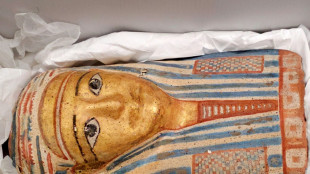Nationalist Nawrocki wins Polish presidential election
Nationalist historian Karol Nawrocki won Poland's presidential election, official results showed on Monday, in a major blow for the country's pro-EU government.
The 42-year-old, an admirer of US President Donald Trump, scored 50.89 percent of votes in Sunday's runoff, the national election commission said.
His 53-year-old rival Rafal Trzaskowski, Warsaw's pro-EU mayor and an ally of the country's centrist government, won 49.11 percent in the highly polarised NATO and EU nation.
"Congratulations to the winner!" outgoing conservative President Andrzej Duda said on X.
Duda, who had endorsed Nawrocki, thanked Poles for "carrying out your civic duty" and for the turnout, which was 71.63 percent.
The results followed a tense evening as both candidates had claimed victory when an exit poll indicated they were neck and neck.
"We will win and we will save Poland," Nawrocki told a crowd of supporters at his election night rally in Warsaw soon after polling stations closed.
Nawrocki's win will block the government's progressive agenda for abortion and LGBTQ rights and could revive tensions with Brussels over rule of law issues.
It could also undermine strong ties with neighbouring Ukraine as he is critical of Kyiv's EU and NATO accession plans and wants to cut benefits for Ukrainian refugees.
Nawrocki visited the White House during his campaign and said he had been told by Trump: "You will win."
US Secretary of Homeland Security Kristi Noem also endorsed Nawrocki when she attended a conservative conference in Poland last week, saying: "He needs to be the next president."
- 'Catholic values' -
Polish presidents have some influence over foreign and defence policy and wield veto power over legislation, which can only be overturned by a three-fifths majority in parliament, which the government does not have.
Reforms planned by Prime Minister Donald Tusk, a former European Council president who came to power in 2023, have been held up by a deadlock with the current president.
Many Nawrocki supporters said they want stricter curbs on immigration and advocate conservative social values and more sovereignty for the country within the European Union.
"Catholic values are important to me. I know he shares them," Warsaw pensioner Lila Chojecka, 60, told AFP as she came to cast her ballot for Nawrocki.
Trzaskowski voters tend to back greater integration within the EU and an acceleration of social reforms.
Trzaskowski supports introducing civil partnerships for same-sex couples and easing Poland's near-total ban on abortion.
Malgorzata Wojciechowska, a tour guide and teacher in her fifties, said Polish women "unfortunately do not have the same rights as our European friends".
Anna Materska-Sosnowska, a political scientist at the University of Warsaw, called the election "a real clash of civilisations".
- Campaign controversies -
Nawrocki's victory is likely to embolden the populist Law and Justice (PiS) party, which ruled Poland between 2015 and 2023.
Nawrocki's campaign was overshadowed at times by controversies over the circumstances in which he bought an apartment from an elderly man and his football hooligan past.
A former amateur boxer, Nawrocki also strongly denied media reports in the last days of the campaign that he had procured sex workers while working as a security guard at a hotel.
His opposition to Ukraine's NATO membership also brought heavy criticism from Ukrainian officials.
Nawrocki used his last campaign hours on Friday to leave flowers at a monument to Poles killed by Ukrainian nationalists during World War II.
"It was a genocide against the Polish people," he said.
Poland is an EU and NATO member and a fast-growing economy of 38 million people with a leading role in international diplomacy surrounding Ukraine.
It is also a key supply route for Western arms and aid going into Ukraine.
G.Abbenevoli--RTC



